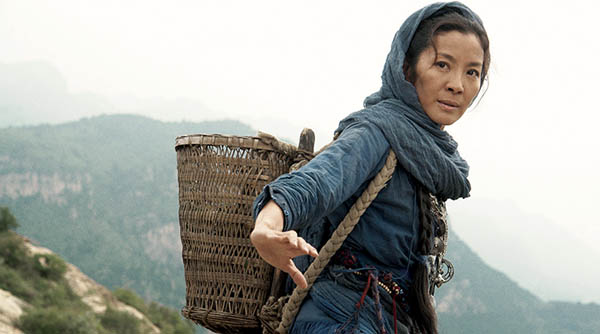|
Reviews of Recent Independent, Foreign, & Documentary Films in Theaters and DVD/Home Video

TRUE LEGEND An old-school throwback to the Shaw Brothers 1970s kung fu flicks, True Legend attempts to sweep away the prettified, prestige strivings of recent martial arts fare, like Hero or Curse of the Golden Flower, which followed the international success of Crouching Tiger, Hidden Dragon, and to return to the genre’s supremely silly roots. Kung fu fans will find much to enjoy, but everyone else will probably be better off just playing the new Mortal Kombat. Saturday afternoons for someone in my generation meant the ritualized watching of Kung Fu Theater on TV: bowdlerized, condensed, badly dubbed cheap prints of decade-old Hong Kong chop-sockey trash interrupted by commercials for breakfast cereal. What we found was a crazed medley of zooms, kitchen-sink sound effects, and casts of obviously low-paid extras doing dangerous stunt work. The movies, for the most part, stunk. But as an adult, I’ve gone back to watching them with the respect only nostalgic fans bring to pop culture ephemera: finding cleaned up prints, with subtitles even. And some of them, particularly Chang Cheh’s output, like Five Deadly Venoms, are as enjoyable as anything else at the movies. At their best, they were ultraviolent, bizarrely imaginative hodgepodges borrowing from the world vocabulary of grindhouse. True Legend, helmed by Yuen Woo Ping, known in the West primarily for his action choreography in The Matrix movies (and Crouching Tiger), hopes to rekindle some of that old Shaw Brothers magic. (He also directed the Kung Fu Theater staple and early Jackie Chan vehicle, Drunken Master.) And at first, it nearly succeeds. The story, set in the 1860s, is all nonsense, but the right kind of nonsense. Su Can (Vincent Zhao), a super-tough general and all-around living embodiment of Confucian heroism, turns down his prince’s offer of a high-ranking government position so he can retire to his hometown and do what reluctant martial arts masters do best: open a kung fu school. But his envious adopted brother, Yuan Li (Andy On), whose real father was killed years earlier by his foster dad, takes the position instead. When Yuan eventually returns home, he’s a changed man. That is, his skin is a deathly grey, with armor sewn into it. He promptly murders the old man, wounds Su, and smashes up the household using a newly-learned technique. It’s called, in one of the many nods to old-school tradition, Five Venom Fist. With it, his touch poisons. Naturally, he gets the venom by… dipping his hands into bowls filled with snakes, scorpions, and spiders, and letting them bite him. (How else would he do it?) But Su and his wife, who happens to be Yuan’s sister and is also a one-note hymn to Confucian virtue, escape, leaving their young son behind to be raised by Yuan. The fleeing couple somehow winds up on a mountaintop with painterly views, tended by a noble wandering herbalist (Michelle Yeoh). Su, humiliated, takes to drink, pounding back great earthen jugs of rice wine that appear in abundance in movies like this—either for smashin’ or for drinkin’. But eventually, he pulls himself together thanks to a series of violent encounters with the God of Wushu (Jay Chou), possibly hallucinated, whom he spars with against a spectacularly terrible CGI backdrop. Now tougher than ever, Su can go back to save his son and get revenge against his brother. So, it’s all fun enough, as far as it goes. Unfortunately the movie, incidentally a huge flop in China when it came out last year, goes on far too long. By the time climactic fight between the brothers rolls around, fatigue, inevitably, has set in for us, if not, as one would think, for the fighters. However, the movie has a whole other story to tell. Not content with a minor but watchable exercise in kung fu craziness, Yuen tacks on a tiresome second half, which plays like a low-rate retread of Ip Man 2. Maybe he has to satisfy some inflexible law of contemporary Chinese martial arts cinema, where the heroes have to redeem national pride by beating up evil foreigners. After Su saves his son and gets revenge, we fast forward to him living as a drunken bum with his kid in a border town near Russia. There, he piddles about until he’s called upon to learn the drunken master technique (of course) in order to defend Chinese honor against some dirty Westerners who have been mistreating the locals in public mixed martial arts-style fights. This totally unnecessary section also includes the brief, sad appearance of the late David Carradine playing the crooked manager of a stable of White wrestlers conforming, one imagines, to Chinese stereotypes: they look like stand-ins for Andre the Giant. For the morbidly curious, Carradine is only onscreen for a few minutes. He looks ill and stiffly recites a few lines. Seeing him at work here is, I suppose, less ghoulish than searching the Internet for his autopsy photos. Barely.
Granted, the plot, such as it is, is merely a vehicle for the fights.
And they’re mostly a blast, especially a crackling opening battle
against a rebel gang in their mountain hideout, fought on wooden bridges
strung over an endless drop (though one wonders what kind of suicidal
outfit would set up base there). Yuen and his three action
choreographers also fix the fatal flaw of old-school kung fu fights.
Thanks to modern stunt work and editing, extras no longer seem to
dutifully hold back until it’s their turn for combat, but instead they always appear
in the thick of things. (This was a problem that even bedeviled the
otherwise excellently staged recent samurai throwback, 13 Assassins).
Modern action filmmakers, from Michael Bay to Christopher Nolan, should
be strapped to a chair and forced to watch this opening sequence until
they understand that a series of confused, rapidly edited tight shots do
not an action sequence make.
Brendon Nafziger
|

